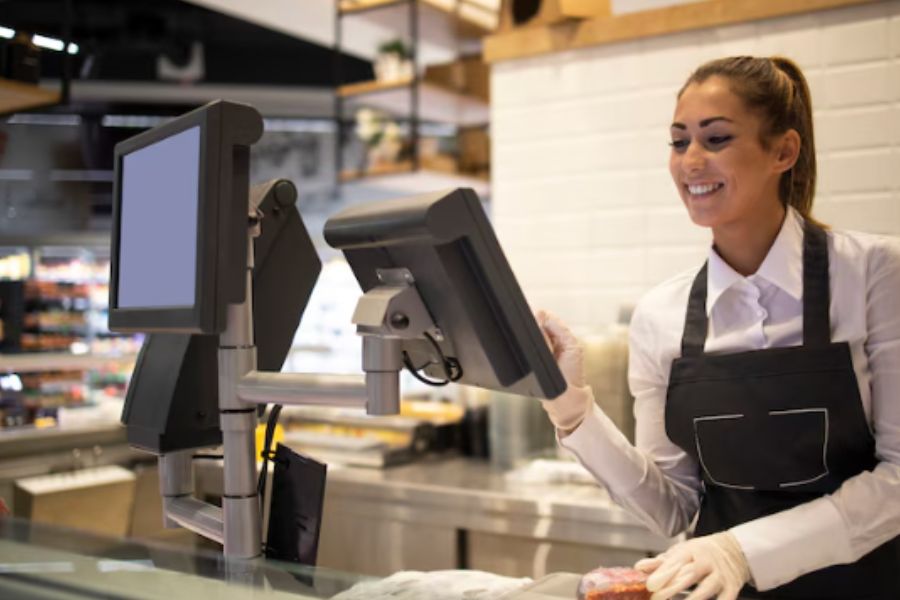In the retail industry, supermarkets are increasingly turning to advanced technological solutions to enhance efficiency and maximize profitability. Among these innovations, the implementation of a Point-of-Sale (POS) system stands out as a pivotal strategy. A well-designed POS system goes beyond simplifying transactions; it serves as a comprehensive tool that positively impacts the bottom line of supermarkets.
In this blog, we will give 5 ways in which a point of sale system for supermarket can significantly boost financial health, revolutionizing traditional retail practices and elevating the overall customer experience. Now, let’s get started!
What is a Point of Sale System for Supermarket? How Does It Work?
A point of sale system for supermarket is a computerized solution designed to streamline and enhance various aspects of retail operations. It serves as a centralized platform that facilitates the management of sales transactions, inventory, and customer interactions. The primary goal of a supermarket POS system is to improve efficiency, accuracy, and overall customer satisfaction.
This POS system for supermarkets has some features such as:
- Checkout process: The system simplifies the checkout process by automating and accelerating transactions. It supports multiple payment methods, including cash, credit/debit cards, and mobile payments, ensuring flexibility for customers.
- Inventory management: One of the core functions of a supermarket POS system is inventory management. It automatically updates inventory levels as products are sold, minimizing the risk of stockouts or overstock situations. This real-time tracking is essential for maintaining optimal stock levels.
- Barcode scanning and product information: Barcode scanning technology is integrated for quick and accurate product identification during checkout. The system stores comprehensive product information, including prices, descriptions, and promotional details.
- Promotion and discount management: The POS system enables supermarkets to easily implement promotions, discounts, and loyalty programs. It also supports dynamic pricing adjustments based on factors like demand and seasonal changes.
- Customer Relationship Management (CRM): Supermarket POS systems often include CRM features to manage customer data and encourage repeat business through loyalty programs. This fosters a personalized shopping experience.
The point of sale system for supermarket works based on the steps below:
- Step 1: Customers bring their selected items to the checkout counter where the cashier scans each product’s barcode using the POS system.
- Step 2: The system calculates the total amount, applies any discounts or promotions, and processes the payment.
- Step 3: The inventory is updated in real-time, deducting the sold items and ensuring accurate stock levels.
- Step 4: Customer data is recorded in the CRM system, allowing for personalized marketing and loyalty programs in future interactions.
In essence, a supermarket POS system acts as the nerve center of retail operations, automating processes, enhancing accuracy, and providing valuable insights for informed decision-making. It revolutionizes the traditional supermarket experience, benefiting both retailers and customers alike.
5 Ways a Point-of-Sale System for Supermarket Boosts Your Bottom Line
A POS is a crucial tool for increasing profits in your grocery store. Beyond being a mere cash register, the POS system provides a range of features that contribute to expanding your business and improving the overall customer experience.
Discover five ways a supermarket’s point-of-sale system can elevate your financial performance.
Streamlined Furniture Inventory Management
Efficient inventory management is at the core of supermarket profitability, and a POS system plays a pivotal role in ensuring streamlined operations. With advanced features for inventory tracking and real-time updates, supermarkets can minimize instances of overstock or stockouts, optimizing the use of shelf space and capital.
This precision in inventory control enables supermarkets to stock popular items adequately, preventing revenue loss due to unavailability while avoiding excess stock that ties up financial resources.
Enhanced Customer Experience
A positive customer experience is synonymous with increased loyalty and repeat business. A supermarket POS system contributes to this by expediting the checkout process. The system’s efficiency reduces waiting times, enhancing customer satisfaction.
Additionally, the integration of customer relationship management (CRM) features allows supermarkets to tailor services, such as loyalty programs, based on individual preferences and purchase histories. This personalized approach fosters a connection with customers, encouraging them to return and contribute to the supermarket’s sustained success.
Effective Sales Promotions
A well-designed POS system empowers supermarkets to implement and manage sales promotions with ease. Whether it’s discounts, bundled offers, or loyalty programs, the system allows for quick and flexible execution. This capability not only attracts customers with enticing deals but also enables supermarkets to adapt swiftly to market trends and competitor actions.
By leveraging the POS system for strategic pricing, supermarkets can drive sales, clear surplus inventory, and create a buzz around promotions, directly impacting the bottom line positively.
Real-Time Reporting and Analytics
The power of data cannot be overstated in the modern business landscape, and a supermarket POS system excels in providing real-time reporting and analytics. Managers gain access to comprehensive insights into sales patterns, popular products, and peak hours. This data-driven approach facilitates informed decision-making, allowing supermarkets to adjust inventory levels, optimize staffing, and refine marketing strategies.
By staying agile and responsive, supermarkets can capitalize on opportunities and address challenges promptly, ultimately boosting the bottom line.
Seamless Integrations
The integration capabilities of a supermarket POS system extend beyond the checkout counter. Seamless integrations with other business systems such as accounting, supply chain management, and e-commerce platforms create a unified and efficient operational ecosystem.
This interconnectedness reduces manual errors, enhances productivity, and ensures consistency across various aspects of the business. With a holistic view of operations, supermarkets can make strategic decisions that positively impact efficiency, cost-effectiveness, and, ultimately, the bottom line.
How to Choose the Right Point-of-Sale System for a Supermarket?
Choosing the right Point of Sale (POS) for a supermarket is a crucial decision that can significantly impact operational efficiency and customer satisfaction.
Here are key considerations to guide the selection process:
- Scalability: Opt for a POS system that can scale with your supermarket’s growth. Consider the ability to add more checkout terminals, accommodate an expanding product range, and handle increased transaction volumes. A scalable system ensures your investment remains relevant as your business evolves.
- Inventory management features: Prioritize a POS system with robust inventory management features. Look for capabilities such as real-time tracking, automated stock replenishment, and the ability to manage perishable goods effectively. A comprehensive inventory system helps prevent stockouts, reduces excess inventory, and improves overall supply chain efficiency.
- Integration capabilities: Choose a POS system that seamlessly integrates with other essential business systems, such as accounting, e-commerce platforms, and supplier management tools. Integration streamlines operations, minimizes data entry errors and provides a unified view of your supermarket’s activities.
- User-friendly interface: Consider the ease of use for both staff and customers. A user-friendly interface simplifies training for employees and ensures smooth, efficient transactions at the checkout. Intuitive design and clear navigation contribute to faster service and reduced errors.
- Security and compliance: Prioritize security features to protect sensitive customer and financial data. The chosen POS system should comply with industry regulations and standards, such as the Payment Card Industry Data Security Standard (PCI DSS). Ensure that the system offers encryption, secure login procedures, and regular security updates.
- Customer Relationship Management (CRM): Look for a POS system with CRM features to enhance customer relationships. This includes loyalty program management, customer data collection, and personalized marketing capabilities. A strong CRM component helps build customer loyalty and provides insights for targeted promotions.
- Vendor support and training: Assess the level of support and training provided by the POS system vendor. A responsive customer support team and comprehensive training resources are essential for overcoming challenges and maximizing the system’s potential. Consider vendor reputation, customer reviews, and the availability of ongoing support.
- Cost of ownership: Evaluate the total cost of ownership, considering not only the initial setup costs but also ongoing fees, maintenance expenses, and potential upgrade costs. Ensure that the chosen POS system aligns with your budget constraints while providing the necessary features for your supermarket’s operations.
ConnectPOS – The Best Point of Sale System for Supermarket
ConnectPOS is one of the top point-of-sale (POS) systems for supermarkets, offering comprehensive features to enhance your business operations. With its user-friendly interface and advanced functionalities, ConnectPOS stands out as a reliable solution for managing transactions and improving overall efficiency in a supermarket setting.
ConnectPOS has the best features that are suitable for the supermarket:
User-Friendly Interface
ConnectPOS presents an interface that is easy to navigate, ensuring swift adaptation by your staff. This feature is especially vital in the fast-paced environment of a supermarket, where efficiency holds paramount importance.
Efficient Transaction Processing
The POS system expedites and ensures accurate transaction processing, reducing customer wait times, particularly during peak hours. This plays a crucial role in fostering a positive shopping experience for your customers.
Inventory Management
ConnectPOS boasts robust inventory management capabilities, allowing supermarkets to monitor stock levels in real time. This functionality serves to prevent stockouts and guarantees the availability of popular items at all times.
Support for Multiple Stores
For supermarket chains or businesses with multiple locations, ConnectPOS provides multi-store support. This feature facilitates centralized data management, ensuring consistency across all outlets.
Customizable Promotions and Discounts
Supermarkets frequently run diverse promotions and discounts. ConnectPOS simplifies the customization of promotions, discounts, and loyalty programs, thereby aiding in attracting and retaining customers.
Integrated Payment Options
The POS system seamlessly integrates with various payment methods, including credit/debit cards, mobile payments, and more. This flexibility enhances the checkout process’s convenience for customers.
Real-time Reporting and Analytics
ConnectPOS offers detailed reporting and analytics tools that provide insights into sales performance, popular products, and customer behavior. This data proves invaluable for making well-informed business decisions.
Customer Relationship Management (CRM)
Supermarkets can leverage ConnectPOS’s POS CRM features, enabling the tracking of customer preferences and purchase history. This data serves as a foundation for creating personalized shopping experiences and launching targeted marketing campaigns.
Scalability
Whether your supermarket is a small local store or part of a large chain, ConnectPOS is scalable to accommodate your business’s growth. The system is adaptable to the changing needs and size of your supermarket.
24/7 Customer Support
ConnectPOS ensures reliable customer support is available around the clock to address any issues or questions that may arise. This commitment ensures the smooth operation of your supermarket without disruptions.
In conclusion, ConnectPOS offers a comprehensive and flexible solution for supermarkets, helping streamline operations, enhance customer experiences, and drive overall business success.
FAQs: Point of Sale System for a Supermarket
What benefits can a supermarket gain from implementing a POS system?
Implementing a POS system in a supermarket offers benefits such as streamlined inventory management, enhanced customer experience, effective sales promotions, real-time reporting, and seamless integrations. These collectively contribute to increased efficiency and a boost in the bottom line.
How does a POS system improve the efficiency of checkout processes?
A POS system expedites the checkout process by automating transactional tasks, reducing waiting times, and ensuring accuracy. This efficiency not only enhances the customer experience but also allows staff to focus on other critical aspects of customer service.
Can a POS system help prevent inventory-related issues like stockouts?
Yes, a POS system plays a crucial role in preventing inventory-related issues like stockouts. By providing real-time inventory tracking and alerts, supermarkets can optimize stock levels, minimizing the risk of running out of popular items.
How many types of POS systems are there?
There are various types of POS systems, including cloud-based POS, mobile POS, and traditional on-premise POS. The choice depends on the specific needs and preferences of the supermarket.
Conclusion
In conclusion, a POS system serves as a comprehensive solution for supermarkets, impacting both financial health and operational efficiency. Its benefits extend from efficient inventory management, enhanced customer experiences, and effective sales promotions to real-time reporting and seamless integrations. Choosing the right POS system is crucial, with considerations ranging from scalability and inventory features to user-friendly interfaces, security, CRM capabilities, and overall cost.
If you are looking for a point of sale system for supermarket, contact us for reliable 24/7 customer support and the best offer.



